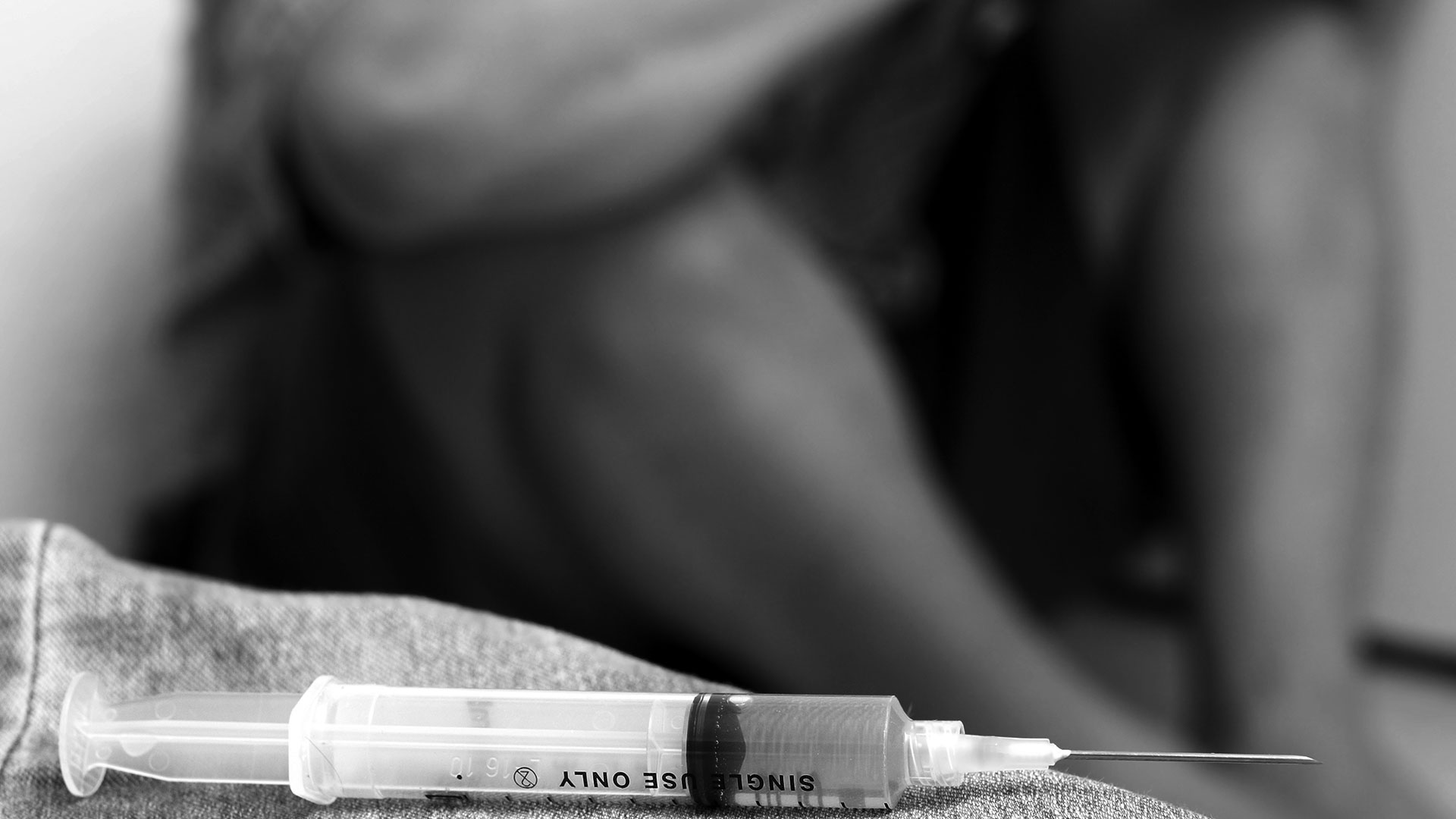06 Dec How Long Does it Take to Detox from Heroin?
Table of Content
Picture this hypothetical scenario: one day, on your way to the office, you decide to take the elevator instead of the stair. This is very much you because, for one, you prefer the stairs as it’s a healthier alternative, and two, you’re petrified of elevators due to a severe fear small spaces.
But, you’re late and have clients waiting for you, and reluctantly choose to take the elevator.
Something goes wrong. “Of course,” you say to yourself, “the one time I take the elevator, and everything goes to hell.”
Immediately, you begin to panic. Beads of sweat begin pouring down your cheeks, and an overwhelmingly sense of dread mixed with torture ensue.
Addiction to heroin is a very similar feeling. A cloud of pure blackness and pain follows you wherever you go. You fight this depilating addiction with continual abuse, and quickly, you’re always on heroin.
Heroin addiction can feel like a hopeless lost cause. Those few moments of clarity can mislead you into believing that there is no possible way you’ll ever stop using.
The drug is simply too powerful.
However, one of the biggest reasons why so many people fail to seek the necessary help they need is because of detoxification. For substance abusers with long-term heroin addiction, the withdrawal process associated with detoxification can seem overwhelmingly painful.
But, although heroin detoxification can be an extremely difficult process, it is manageable to endure. There is common misconception that detoxification is a systematic approach to ending heroin, where patients sits in an isolated room waiting for the drug to pass their system.
This couldn’t be further from the truth. The reality is, there are many alternative methods for patients to detox from heroin. Today’s detoxification process is structured to ensure the most comfortable and effective solution possible. Depending on individual circumstances, detoxification can be modified and customized to fit the needs of specific patients. But before we dive into specific time length and withdrawal symptoms, let’s find what heroin detoxification actually means.
Heroin detoxification is a non-life-threatening, however uncomfortable, process in which an individual voluntarily makes the decision to discontinue the usage of the substance. It has been documented as a similar experience 10x more uncomfortable than the flu. The objective of heroin detoxification is to cleanse the body from any traces or toxins of the drug. Once the individual has successfully surpassed this stage in the recovery process, they are better prepared for treatments options such as cognitive behavioral therapy (CBT), rehab, sober living, etc.
How Long Does it Take to Detox from Heroin?
Depending on an assortment of variables, the severity and time length of heroin detoxification varies. Typically, heroin detoxification lasts approximately one week.
Withdrawal symptoms usually begin to take effect within the initial eight hours, and peak approximately 70 hours after the last dose of heroin. After the initial three days, symptoms will usually begin to decline in severity.

24 to 48 hours
For most, this time period of detoxification is usually perceived as the most difficult. After eight hours, cravings will begin to surface and anxiety will gradually intensify.
Because of the addiction, the brain now depends on heroin to “feel normal.” Detoxification coerces an interruption in the way the brain receives messages; during this time, the brain will “panic” and manipulate its host to continue using.
Besides the emotionally draining effect, individuals enduring heroin detoxification will also experience physical alignments. Dopamine, the brain’s natural signal to reward its host, blockades feelings of physical pain and discomfort.
Because heroin coerces the brain to release an overwhelming surplus of dopamine, heroin addicts become “immune” to experiencing pain while under the influence.
When heroin is no longer supplied to the brain, aches and pains will become more prevalent during the initial two days; however, for addicts with chronic injuries, detoxification may prove to be an agonizing endeavor. The most common side effects during this time are anxiety and cravings, insomnia, aches and pain, diarrhea, nausea/vomiting, panic attacks, muscle weakness and fatigue, sweating, and loss of appetite.
72 to 120 hours
Withdrawal side effects will begin to dissipate during this time. The “worst” of discomfort may be over, however, cravings are still very much present. Focusing on strengthening the body’s immune system is imperative because the body is utilizing much of its focus on detoxification.
Sleep, diet and proper exercise are essential.
The most common side effects during this time are depression, muscle cramps, seizures, cold sweats, etc.
After a Week
Once the patience makes it past six days, they have successfully overcome the worst of the withdrawal symptoms. Patients will experience similar symptoms during the acute phases, but in a lowered potency. Trouble sleeping, concentrating and eating are the most evident symptoms during this time.
Body Temperature
Because heroin lowers body temperature as well as respiration and blood pleasure, during detoxification, individuals will endure a steady rise in all three natural processes.
What Affects Heroin Withdrawal Intensity?
Age
As you age, your body has a more difficult time healing itself. Younger individuals have more active immune systems; additionally, as you get older, you begin to develop more health issues. Because of this, the body’s immune system is working harder to keep you healthy and feel good, and when that is couple with heroin detoxification, the body takes longer to heal.
Current Health
One of the biggest determinations regarding the severity of withdrawal symptoms is based on general health. Typically, individuals undergoing heroin detoxification are in poor health due to insomnia, malnourishment, nausea, emaciation and lack of exercise. Because the body is working harder to take of so many issues at once, detoxification will take longer.
Frequency of heroin use
Without question, individuals that are high around-the-clock versus those who use once daily will endure a much more intense and uncomfortable detoxification. The higher and more consistent the dose, the more the brain will interpret heroin as an important chemical to have. When heroin is longer supplied, the brain craves those missing chemicals, those resulting in a more uncomfortable detoxification.
How heroin was administered into the body
There are several different ways in which heroin can be used. However, each method varies in potency. For example, an individual that snorts heroin will have less of a euphoria than that of someone who intravenously administers the drug. The higher the potency of dose, the more uncomfortable the detoxification process will be.
Options for Heroin Detox
Stopping “Cold Turkey”
Stopping “cold turkey” has been researched to have the lowest success rate. This form of detoxification involves no assistance and is done abruptly. However, there are benefits of “cold turkey” heroin detoxification as withdrawals symptoms won’t last long because no there was no “easing” (i.e., lowering the quantity of heroin after each dose) involved.
Inpatient Detox
Inpatient treatment has the highest level of success regarding detoxification. Typically, this process involves seven days of intensive care, where patients undergo cognitive behavioral therapy, talks with other patients and relaxation.
Inpatient detox may or may not be medically-assisted; this is determined by physician evaluation, where drugs such as Methadone, Suboxone and benzodiazepines (e.g., Xanax, Valium, Klonopin, etc.). Professional care is provided around-the-clock, which helps to ensure patients that they feel safe.
Residential Addiction Detox Treatment
This method of treatment involves detoxification to occur within a controlled, living environment. Not all staff members are doctors are medically trained, but most likely have personal experiences with battling for addiction of their own. This helps many patients because there is a mutual understanding of the situation.
Things you can do to mitigate withdrawal symptoms
Bath
Taking a nice hot bath during detoxification is a wonderful way to soothe the body. Because withdrawal symptoms are similar to that of a fever, taking a bath alleviates tension from aching muscles and calms the body from restlessness—setting up a good foundation for the days to come.
Meditation and Deep Breathing Exercises
Finding your Zen is a wonderful tool you can use, as it is a powerfully effective method for decreasing the intensity associated with withdrawal. Mediation will transpire an inner serenity you didn’t think you had. The great thing about meditation is you can do it anywhere and anytime. Simply find a quiet place, inhale slowly through your nose for five seconds by filling and expanding your belly with air, holding for four seconds, then slowly exhaling through the mouth.
When you practice mediation, many benefits emerge such as:
- Natural release of dopamine
- Boosted immunity
- Release of toxins
- Encourages positive feelings such as clarity and focus
- Improves good blood circulation
- Elevates mood and eliminates emotional distress
Adequate Sleep with a Consistent Schedule
Getting a good night’s rest is critical towards overcoming withdrawal symptoms. Not only does sleep strengthen your immune system, it also brings clarity to a difficult situation.
Things you can do to improve your sleep pattern during heroin detoxification:
- Vitamin D – natural sunlight or ingesting the vitamin as a pill tablet, is essential towards promoting deep, restful sleep.
- Diet – A poor diet directly effects whether or not you get a good night’s rest. It’s important to not only eat healthy, but to eat enough food to not feel hungry before sleep. Because heroin withdrawal deteriorates appetite, many patients will not eat during this phase, which as a results, affects sleep.
- Melatonin – natural chemical which regulates sleep and wake cycles.
- Limit Caffeine – Caffeine dehydrates the body and increases the body heart rate. Do your best to eliminate caffeine during detoxification, or at least to not ingest after eight hours before bed.
Surround yourself with the right type of people
After detoxification, it’s important to make sure you don’t relapse. One of the most important factors of whether or not this ensues is to surround yourself with sober, positive people. Successful detoxification is many times meaningless if you go back to the same routine as before, and surround yourself with the same people that got you into this scenario.
Find your new passion
Heroin is powerful.
Many things on life simply cannot compare to the overwhelming euphoria associated with its use. This is why you must either find or go back to something that you love.
Whether it’s writing, running, playing the guitar, painting, reading—it doesn’t matter. You’re essentially rebooting your life, and you are going to need something you not only enjoy doing, but a definitive passion for. Allow this to become your new heroin, and life as you know will change for the better.
Don’t settle with one thing, but instead, explore many.
Get outside and explore the world and the many beautiful things that this world is filled with. Talk with people you may have never talk with before. Gain a fascination and introspective curiosity of what is “out there” as well as what you’re capable of.
Talk with Family Members and Friends
Many people trying to overcome their addiction find it extremely difficult to talk about their experience with friends and family.
And for obvious reason.
But many people you care about may not understand that your addiction was the source of your issues. This is not to be used as an excuse, but rather, to establish a sincere dialogue where you’re transparent and genuine.
Becoming open about your experience might also be the most important thing you can do for yourself.
Speaking releases anxiety and improves confidence, while reduces built-up feeling that can negatively impact sobriety.
If you have hurt someone, let down a friend, ignored a loved one, it is important to make your peace with them and let them into your world. When you talk, you might also find out something you didn’t know about a family member or friend, as they may have their own demons with depression and addiction. This allows you to become a positive source of influence, where your perspective becomes enlightening and helps them to overcome their issues.

Resources:
“Heroin Detox.” Rehabs.com. 15 Mar. 2019. https://luxury.rehabs.com/drug-detox/how-long-does-it-take-to-detox-from-heroin/
“Heroin Withdrawal.” Drugrehab.com. 25 May 2018. 15 Mar. 2019. https://www.drugrehab.com/addiction/drugs/heroin/withdrawal/
Condron, Patrick. “Heroin Detox Symptoms, Timeline, Medications And Treatment.” Mentalhelp.net. 15 Mar. 2019. https://www.mentalhelp.net/articles/heroin-detox/






No Comments